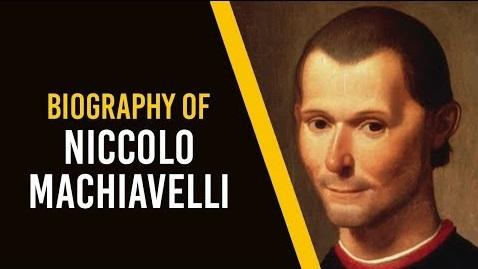Table of Contents
EARLY LIFE
- Machiavelli was born in Florence, Italy in 3 May 1469 the third child and first son of attorney Bernardo di Niccolò Machiavelli and his wife, Bartolomea di Stefano Nelli.
- Machiavelli was born in a tumultuous era in which popes waged acquisitive wars against Italian city-states, and people and cities often fell from power as France, Spain, and the Holy Roman Empire.
POWER
- Machiavelli was taught grammar, rhetoric, and Latin. In 1494 Florence restored the republic, expelling the Medici family that had ruled Florence for some sixty years.
- The young Niccolò Machiavelli became a diplomat after the temporary fall of Florence’s ruling Medici family in 1494.
- He served in that position for 14 years in Italy’s Florentine Republic during the Medici family’s exile, during which time he earned a reputation for deviousness.
POWER
- In the first decade of the sixteenth century, he carried out several diplomatic missions: most notably to the Papacy in Rome. Moreover, from 1502 to 1503, he witnessed the brutal reality of the state-building methods
- Between 1503 and 1506, Machiavelli was responsible for the Florentine militia. Under his command, Florentine citizen-soldiers defeated Pisa in 1509. However, Machiavelli’s success did not last.
- In August 1512 the Medici, backed by Pope Julius II, used Spanish troops to defeat the Florentines
EXILED
- After his involvement in an unsuccessful attempt to organize a Florentine militia against the return of the Medici family to power in 1512 became known, Machiavelli was tortured, jailed and banished from an active role in political life.
- He denied involvement and was released after three weeks. In his later years, Niccolò Machiavelli resided in a small village just outside of Florence and devoted himself to studying and writing of the political treatises that earned his place in the intellectual development of political philosophy and political conduct
NEW BIRTH
- Machiavelli died in 1527 at 58 after receiving his last rites. He was an Italian diplomat, politician, historian, philosopher, humanist, writer, playwright and poet of the Renaissance period.
- He has often been called the father of modern political philosophy and political science.
- Machiavellianism is widely used as a negative term to characterize unscrupulous politicians of the sort Machiavelli described most famously in The Prince.
THE PRINCE
- As leaders rapidly rose and fell, Machiavelli observed traits that, he believed, bolstered power and influence. In 1513 he wrote the prince.
- Unlike the noble princes portrayed in fairy tales, a successful ruler of a principality, as described in Machiavelli’s writings, is brutal, calculating and, when necessary, utterly immoral.
- “The fact is that a man who wants to act virtuously in every way necessarily comes to grief among so many who are not virtuous. Therefore, if a prince wants to maintain his rule he must be prepared not to be virtuous, and to make use of this or not according to need.”
THE PRINCE
- Making an example of one or two offenders is kinder than being too compassionate, and allowing disorders to develop into murder and chaos which affects the whole community.”
- Keeping one’s word can also be dangerous, he said, since “experience shows that those who do not keep their word get the better of those who do.”
- Moreover, Machiavelli also believed that when leaders are not moral, it’s important they pretend they are to keep up appearances. “A prince must always seem to be very moral, even if he is not,” he wrote.
FORTUNE AND VIRTU
- As Machiavelli saw it, there were two main variables in life: fortune and virtù.
- Virtù (not virtue) meant bravery, power and the ability to impose one’s own will,Manliness,Courage.
- Fortune is very important but fortunes favours the brave
MACHIAVELLIANISM
- Machiavelli is most famous for a short political treatise, The Prince, written in 1513 but not published until 1532, five years after his death. Although he privately circulated
- His works are sometimes even said to have contributed to the modern negative connotations of the words politics and politician. • More obviously, the adjective Machiavellian became a term describing someone or something that is “marked by cunning, duplicity, or bad faith.






















 WhatsApp
WhatsApp